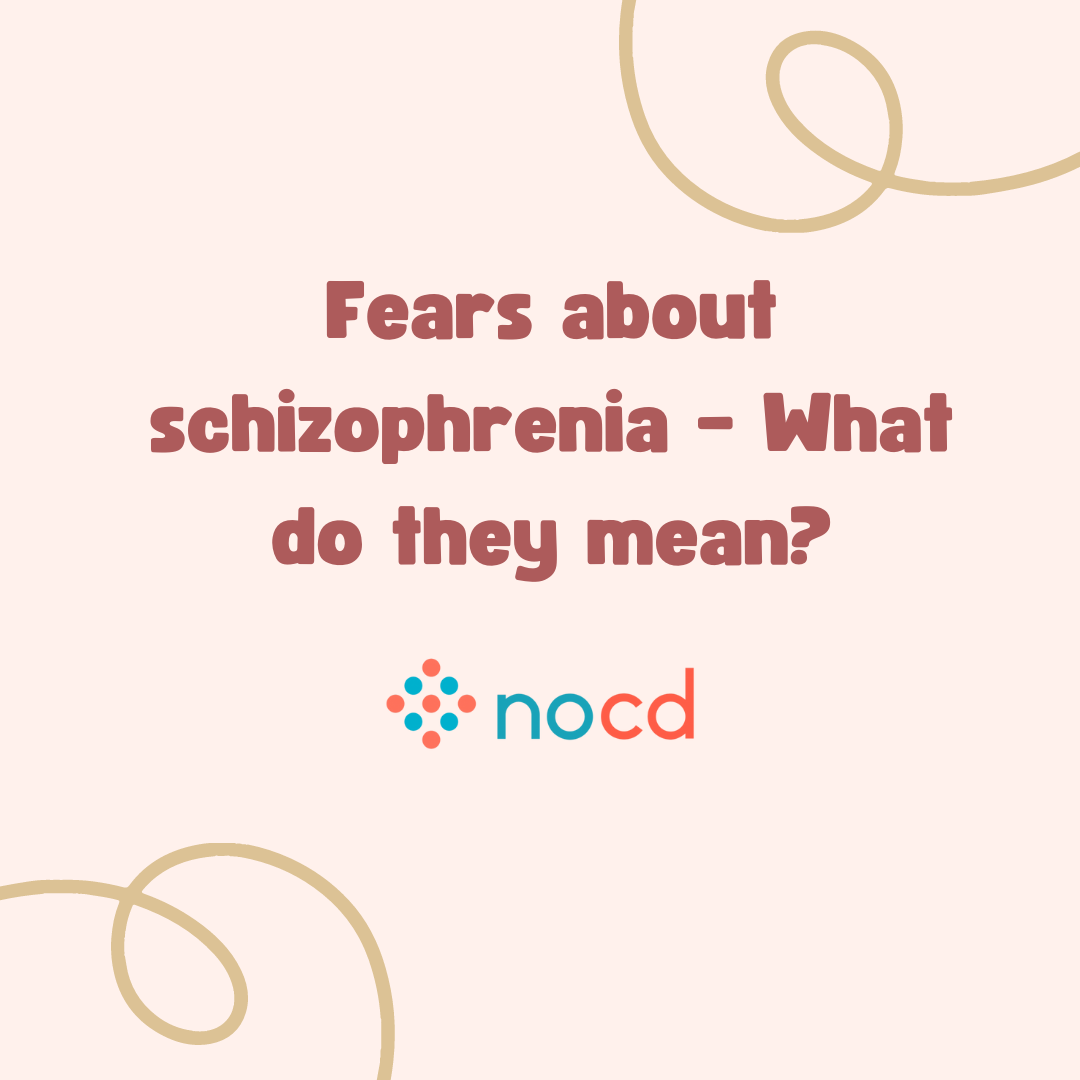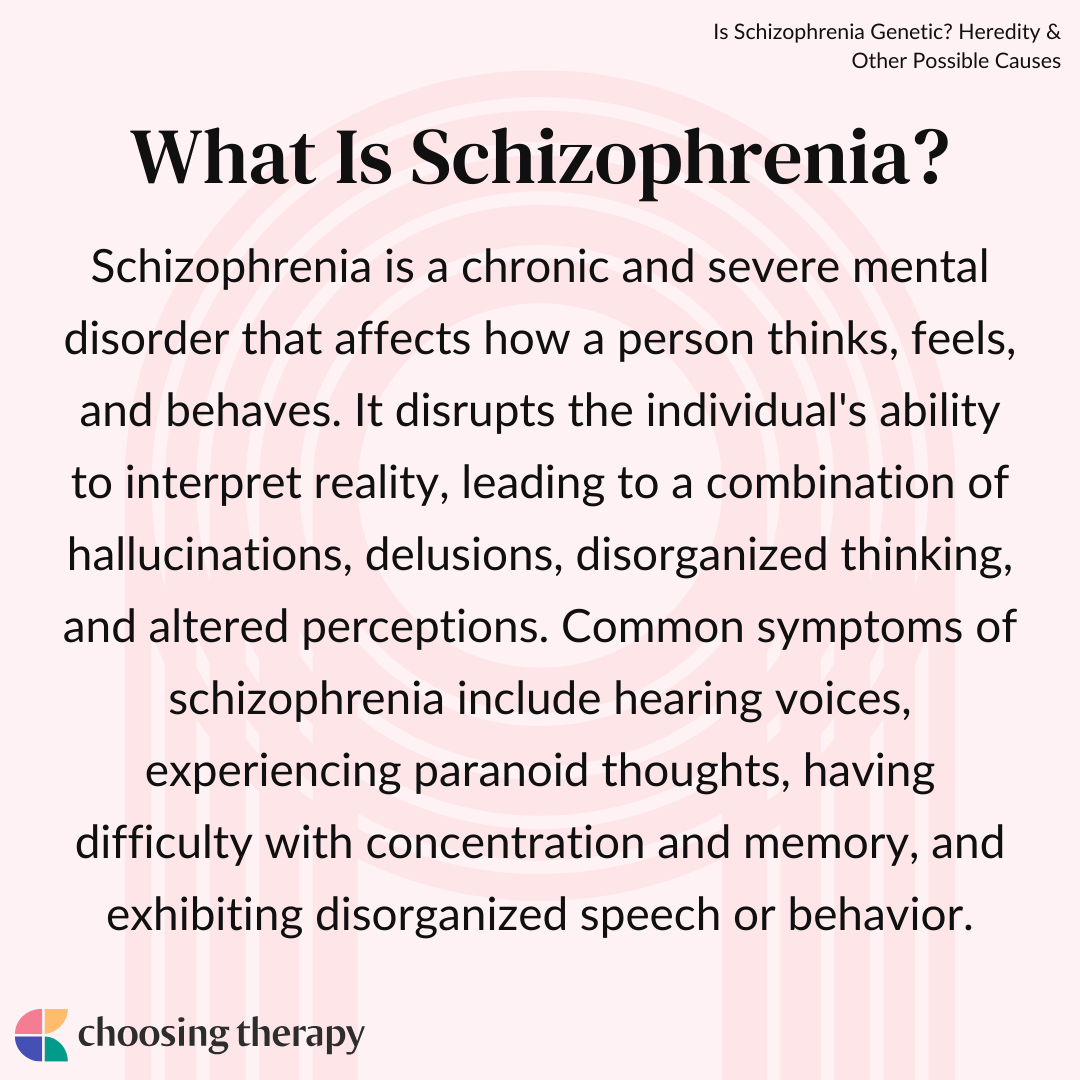Schizophrenia is a complex condition with both genetic and environmental factors contributing to its development. Research suggests a strong genetic component, with studies indicating that individuals with a family history are at higher risk of developing schizophrenia.1, 2, 3 Genetics alone, however, does not determine the onset of schizophrenia. Environmental influences, prenatal complications, and certain chemical imbalances in the brain, among other factors, also play a role.
Schizophrenia Treatment, Covered by Insurance Grow Therapy enables you to find a psychiatrist or psychiatric nurse practitioner who can diagnose your condition, prescribe appropriate medications, and monitor your reaction to medication. Find A Provider
What Is Schizophrenia?
Schizophrenia is a chronic and severe mental disorder that affects how a person thinks, feels, and behaves. It disrupts the individual’s ability to interpret reality, leading to a combination of hallucinations, delusions, disorganized thinking, and altered perceptions. Common symptoms of schizophrenia include hearing voices, experiencing paranoid thoughts, having difficulty with concentration and memory, and exhibiting disorganized speech or behavior.
Schizophrenia is not uncommon. According to the World Health Organization (WHO), “Schizophrenia affects approximately 24 million people or 1 in 300 people (0.32%) worldwide. This rate is 1 in 222 people (0.45%) among adults.”4 It typically emerges in late adolescence or early adulthood, though it can manifest at any age. Early to mid-20s is most common, with anything prior to 18 considered early onset. Onset younger than 13 is highly atypical, while mid-to-late 30s is not uncommon. It is considered a lifelong ailment, as most individuals require ongoing treatment and support to manage their symptoms effectively.
Is Schizophrenia Hereditary?
Schizophrenia has a strong genetic component, with research indicating that genetic factors contribute significantly to its onset. For example, “A person who has a genetically identical twin with schizophrenia has a 50% chance of having schizophrenia. A person with a sibling or a parent with schizophrenia has a 10% chance of having schizophrenia.”3 While no single gene has been identified as the sole cause of schizophrenia, experts believe that multiple genes are involved, each contributing a small effect.
Researchers have been studying specific genes that may play a role in schizophrenia. Variations in certain genes, such as the DISC1 gene and the COMT gene, have been associated with an increased susceptibility to the disorder.5, 6 However, it’s important to note that having these genetic variations does not guarantee the development of schizophrenia. The interplay between genetic factors and environmental influences is complex and not yet fully understood.
Neuroimaging techniques have also contributed to our understanding of schizophrenia. Brain imaging studies have revealed differences in brain structure and functioning in individuals with schizophrenia, supporting the notion that there are underlying neurobiological abnormalities associated with the disorder. While genetic factors are believed to be significant, it is widely accepted that a combination of genetic, environmental, and neurobiological factors contribute to the development of schizophrenia.
DRD2 Variant
The DRD2 gene, which codes for the dopamine D2 receptor, has been extensively studied in relation to schizophrenia.7 Dopamine is a neurotransmitter that plays a crucial role in various brain functions, including reward, motivation, and cognitive processes. Research has found an association between certain variants of the DRD2 gene and an increased risk of developing schizophrenia.
One variant of the DRD2 gene that has drawn attention is known as the Taq1A polymorphism.8 Studies have suggested that individuals with this variant may have a higher susceptibility to schizophrenia. The Taq1A polymorphism is thought to affect the density and functioning of dopamine D2 receptors in the brain. Altered dopamine signaling in specific brain regions has been implicated in the symptoms and pathophysiology of schizophrenia.
ZNF804 Variant
Studies have identified variations in the ZNF804 gene that appear to be linked to an increased risk of developing schizophrenia.9 ZNF804A is involved in regulating gene expression and plays a role in brain development and function. Accordingly, certain variations in the ZNF804A gene may affect neural connectivity and synaptic function in the brain, potentially contributing to the development of schizophrenia. These genetic variations may influence the way neural networks are formed and operate, impacting cognitive processes and increasing susceptibility to the disorder.
Other Possible Causes of Schizophrenia
The development of schizophrenia is believed to be influenced by a combination of genetic, environmental, and neurobiological factors. Environmental factors such as prenatal complications, exposure to stress or trauma, substance abuse, and social factors can also contribute to the onset of the condition. Additionally, neurobiological factors, including imbalances in neurotransmitters like dopamine and abnormalities in brain structure and function, are believed to play a role.
Brain Structure & Function
Brain structure and function are closely linked to the development of schizophrenia. Neuroimaging studies have revealed differences in the brain structure of individuals with schizophrenia compared to those without the disorder. These differences include abnormalities in brain regions such as the prefrontal cortex, hippocampus, and thalamus, which are involved in cognitive processes, memory, and emotional regulation.10 Furthermore, abnormalities in brain function have been observed in individuals with schizophrenia. Functional imaging techniques have shown altered patterns of brain activity and connectivity, suggesting disruptions in neural networks and information processing.
In terms of neurotransmitters, dopamine is believed to play a significant role in schizophrenia. Excessive dopamine activity in specific brain regions, particularly the mesolimbic pathway, has been associated with positive symptoms such as hallucinations and delusions.11 On the other hand, abnormalities in other neurotransmitters, such as glutamate and gamma-aminobutyric acid (GABA), have also been implicated in the disorder. Imbalances in these neurotransmitter systems can contribute to the cognitive and negative symptoms observed in schizophrenia.
Substance & Drug Abuse
Substance and drug abuse can have a significant impact on individuals with schizophrenia, either exacerbating existing symptoms or triggering new ones. Substance abuse can heighten the severity of psychotic symptoms, disrupt medication effectiveness, and impair overall functioning.
Insofar as cannabis and schizophrenia, research suggests that there is a complex relationship between the two. Some studies have found that cannabis use, particularly during adolescence, may increase the risk of developing schizophrenia in vulnerable individuals. Additionally, cannabis use has been associated with more severe symptoms and poorer outcomes in individuals already diagnosed with schizophrenia. The active compound in cannabis, delta-9-tetrahydrocannabinol (THC), is believed to influence dopamine release, which can contribute to the onset or worsening of psychotic symptoms.
Alcohol abuse is also known to impact individuals with schizophrenia negatively. Alcohol can interfere with the effectiveness of antipsychotic medications, diminish cognitive functioning, and increase the risk of relapse. Further, alcohol use can worsen the negative symptoms of schizophrenia, such as social withdrawal and apathy, as well as contribute to a higher risk of suicide.
Environmental Factors
It’s widely recognized that environmental factors can play a role in the development of schizophrenia symptoms. These may include childhood trauma, prenatal and perinatal factors (e.g., maternal infections during pregnancy, maternal stress, complications during), urban upbringing, and toxic stress. Childhood trauma, for example, is a significant factor. Experiencing significant trauma during childhood, such as physical or sexual abuse, neglect, or severe emotional stress, has been associated with an increased risk of developing schizophrenia later in life. Traumatic experiences can disrupt brain development and contribute to the manifestation of symptoms.
Prolonged or excessive stress, referred to as toxic stress, can have detrimental effects on an individual’s well-being. It typically arises from ongoing, adverse experiences, such as abuse, neglect, or chronic family dysfunction. Unlike normal stress responses that are temporary, toxic stress is persistent and overwhelms the individual’s ability to cope effectively. This chronic stress can disrupt brain development, impair cognitive function, and increase the risk of mental health problems like anxiety, depression, post-traumatic stress disorder (PTSD), and schizophrenia. Growing up in urban environments with high population density, social adversity, and limited access to green spaces has been linked to toxic stress and a higher risk of developing schizophrenia.
Toxins
Prenatal or early-life exposure to certain toxins or environmental pollutants can potentially increase the risk of developing schizophrenia. These toxins can include heavy metals (like lead or mercury), pesticides, air pollutants, and other environmental contaminants.
Inflammation
Chronic or excessive inflammation can have adverse effects on the brain and may contribute to the development of schizophrenia. It is hypothesized that inflammatory processes can disrupt normal brain development, impact neurotransmitter systems (such as dopamine and glutamate), and lead to changes in brain structure and function. Accordingly, some treatment approaches involving diet consider gluten-free living to help in this respect.12
Resources For Schizophrenia Treatment for Schizophrenia, Covered by Insurance – Grow Therapy enables you to find a psychiatrist or psychiatric nurse practitioner that can diagnose your condition, prescribe appropriate medications, and monitor your reaction to medication. Find A Provider Schizophrenia Newsletter – Free newsletter from Choosing Therapy for those impacted by Schizophrenia. Get encouragement, tips, and latest info sent twice per week. Sign Up
Will My Children Develop Schizophrenia?
While having a parent with schizophrenia does increase the risk of developing the disorder, it does not guarantee that children will develop schizophrenia.3 Fortunately, there are things parents can do in attempt to reduce the risk or impact of schizophrenia in their children. Providing a stable, loving, and supportive home environment can promote overall mental well-being in children. Being aware of early warning signs of mental health issues and seeking professional help promptly can make a difference. Moreover, promoting a healthy lifestyle for children, including regular exercise, a balanced diet, adequate sleep, and stress management techniques, can contribute to their overall mental and physical well-being.
Currently, there are no widely available genetic tests that can definitively predict the development of schizophrenia.13 Because of this, genetic testing is not widely implemented nor is it routinely used for diagnostic purposes. Such tests, however, may be used to assess whether one may be at risk as well as guide more individualized treatment efforts.
How Is Schizophrenia Treated?
The treatment of schizophrenia typically involves a combination of therapeutic and medical approaches to help manage symptoms and improve overall quality of life. Therapeutic interventions commonly used include medication, psychotherapy, psychosocial interventions, and self-help and support groups. It’s important to note that treatment plans should be tailored to individual needs, and regular follow-up with healthcare professionals is crucial for monitoring progress, adjusting medications, and providing ongoing support. Early intervention, consistent treatment adherence, and a comprehensive approach involving both medical and therapeutic interventions can greatly contribute to the management of schizophrenia symptoms.
Ways to treat schizophrenia include:
Medications
Antipsychotic medications are commonly used to alleviate the symptoms of residual schizophrenia, which refers to the presence of mild or lingering symptoms following the initial treatment of an acute episode.14 Antipsychotics help reduce or eliminate symptoms such as delusions, hallucinations, and disorganized thinking. Depending on the individual’s specific symptoms and needs, a doctor may also prescribe additional medications to address related conditions. For example, if there are symptoms of depression, an antidepressant may be prescribed. If mood instability is present, a mood stabilizer could be considered. Similarly, if anxiety is a significant concern, anti-anxiety medications may be prescribed.
Therapy
Psychotherapy is an important addition to the treatment plan for individuals struggling with schizophrenia. It can help address various aspects of the disorder, including managing symptoms, improving coping skills, enhancing communication, and fostering social and occupational functioning. To find the right therapist, individuals can start by seeking referrals from their healthcare provider, contacting local mental health organizations, or using online directories. It’s important to find a therapist experienced in working with schizophrenia or other psychotic disorders. Online therapy options can also be beneficial, offering convenience and accessibility.
The types of therapy that might be recommended include cognitive-behavioral therapy (CBT), which focuses on identifying and modifying negative thought patterns, and family therapy, which involves the client’s loved ones to improve communication and support. Other modalities like supportive therapy or social skills training may also be beneficial, depending on the individual’s needs and goals.
Hospitalization
If a patient with schizophrenia experiences extreme symptoms or poses a risk of harm to self or others, hospitalization or in-patient care may be recommended. During a hospital stay, the individual receives intensive care and monitoring in a controlled environment. The specific details of a hospital stay can vary depending on the severity of symptoms and the facility’s protocols. It typically involves a comprehensive evaluation, adjustment of medications, individual and group therapy sessions, and structured daily activities aimed at stabilizing the individual’s condition. The length of hospitalization can vary, ranging from a few days to several weeks, depending on the individual’s response to treatment and the stabilization of their symptoms.
In My Experience
Additional Resources
To help our readers take the next step in their mental health journey, Choosing Therapy has partnered with leaders in mental health and wellness. Choosing Therapy is compensated for marketing by the companies included below.
Treatment for Schizophrenia, Covered by Insurance – Grow Therapy enables you to find a psychiatrist or psychiatric nurse practitioner that can diagnose your condition, prescribe appropriate medications, and monitor your reaction to medication. Find A Provider
Talk Therapy – BetterHelp has 25,000+ licensed therapists who provide convenient and affordable online therapy. BetterHelp starts at $65 per week. Visit BetterHelp
Schizophrenia Newsletter – Free newsletter from Choosing Therapy for those impacted by Schizophrenia. Get encouragement, tips, and latest info sent twice per week. Sign Up
For Further Reading
Fears about schizophrenia – What do they mean? If you’re experiencing unwanted thoughts about losing your mind, becoming psychotic, or developing schizophrenia, it may actually be a sign of OCD more specifically health concern OCD. You might find yourself constantly questioning the state of your mind, which can cause you to be overly focused on feeling different than usual.







